College is a place where pebbles are polished and diamonds are dimmed – Robert G. Ingersoll
When we talked about the inadequacy of schools, we started with this golden quote:
Education either functions as an instrument to bring about conformity or freedom. Let’s give our children freedom.
Trish Millines Dziko
Schools are more or less mandatory, not because of the less-than-ideal Structure most of them currently maintain and not because of the ineffective Learning they provide, but because this is where children and teenagers form socially (especially if the emotional environment is good). So we need some form of schools, even if the current form is so bad that it has to be destroyed and rebuilt from the ground up.
After I figured out high school was very ineffective but squeezed out all the social fun from it, I went to a University considered locally elite, top 5 in my country of Bulgaria, to study the best major (computer engineering – the same as my parents). I didn’t really think twice – In Bulgaria, everyone goes to a university except for poor and marginalized ethnic minorities.
The experience was so unexpectedly mediocre that I was shocked. WTF was going on? The huge halls were like a grand but empty shell with a parody of learning happening inside, even worse than fucking School. The Motivation levels of 70% of the professors and 90% of the students were below zero. The material was outdated, obscure, and as far away from practical use as humanly possible. At least one professor was openly corrupt-but-also-pure-evil (as in “I won’t let certain people pass the exam if they don’t pay”). Everybody knew about this professor, but no one really did anything. By the way, this whole parody was subsidized by the government and cost taxpayers tens of millions a year.
After 2 years, I quit, and these 2 years didn’t bring me any useful practical knowledge, not a single skill valuable on the Job market. None at all. To be honest, I only stuck for 2 years because of the great friends I had made and all the pretty girls. Quitting somehow didn’t pop up in my head as an option earlier. And if this was the best major in an elite university, how were the others doing? Surely not better…
I vividly remember the moment the thought of quitting suddenly came into existence. I was walking along a long, dark, empty hallway after having a minor argument with a lab assistant and leaving the lab. I thought how useless and unfriendly this institution felt to me. Suddenly, I remembered it was my choice to give it control over my life, and I can end this ongoing bad choice right now. I walked out and made a beeline for the bus stop with a huge smile on my face, never to return. It felt like the first major decision in my life I took, the first touch of real Freedom.
After I quit, the storm came swiftly. My parents were shocked and furious. My mentor, who has taught me so much about Business and whom I’m deeply thankful for, thought it was a mistake. Even some of my fellow students, who knew first hand the Bullshit we were experiencing on a daily basis, thought I was wrong and that “the process sucks but the degree is worth it”. Others acknowledged that my decision was the only sensible one but still didn’t quit themselves, showing the huge power of Inertia which drives every one of us into a trajectory towards default choices we know are wrong.
However, I was adamant. This was the day I claimed my freedom from the world of Bullshit and I was not going to back down. I felt a huge relief that my life Direction was back in my own hands. I didn’t understand the world I was diving in, but I was not afraid and didn’t care. I had broken my chains and could not wait to become a Hunter. And I had the Time, the space, and the Energy to restart my Education from scratch and this time do it right.
Grotesque experiences in life have their value. I learned so much about how education shouldn’t be done that in the following years, my Self-education followed the best possible principles:
Instead of wishfully thinking I will always have motivation, I creatively created my environment to have one

When there was no clear goal, I sought fundamental Goals like Freedom (for myself and others) and Money.

Instead of overcomplicating concepts like in the university, I always tried to simplify them to the basics.

Instead of learning in large, inefficient groups, I learned from mentors in one-on-one conversations.

Instead of learning in theory, I tried everything in practice. Instead of going slow, I went fast.
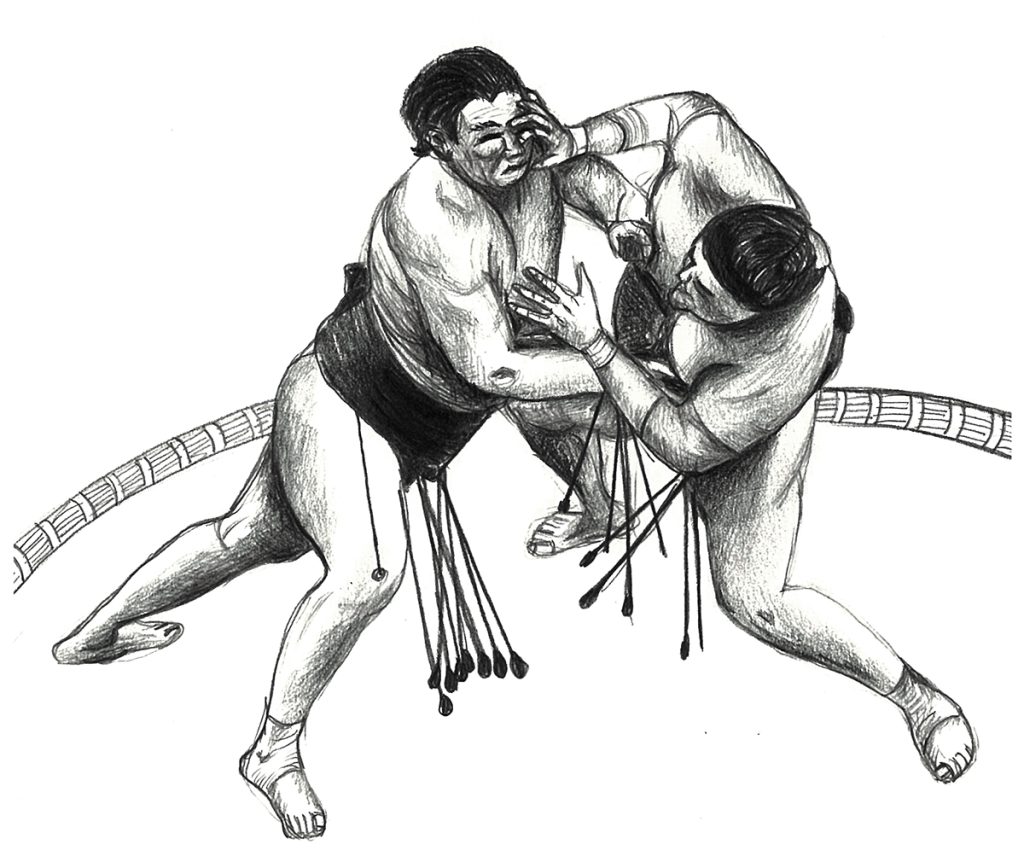
Instead of sacrificing my freedom and spending money on education, I tried to earn while I learn.
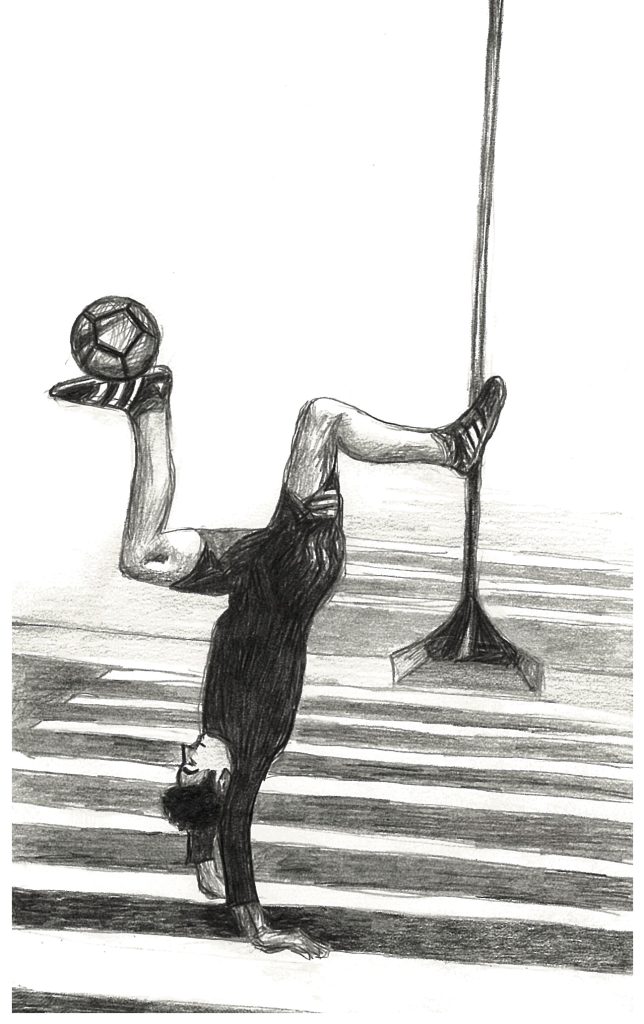
After some years went by I figured out the core reason for the disaster that the education quality was. University is just another old system that looks to preserve itself more than anything. It was not friendly to positive Change, not to speak of a radical one. Even though it desperately needed it.
University is old both as a concept and as an individual institution. The world today changes much faster than it can follow.
And as with all old, badly functioning systems, we need to ask a fundamental question: Should they even exist?
There were days when universities were the only way to acquire knowledge and meet people. And there were days when a degree was not such a bad long-term investment. But we live in the present, not the past!
There are many things people want to study, and 25000+ universities ranging from Bulgaria’s “parody” universities (like the one I went to) all the way to Harvard, MIT, Stanford, Oxford, and Cambridge. We obviously cannot give a single general advice. We need to ask 2 questions, one about the university and one about ourselves, and then arrive at a binary answer whether we need a university or we can show it the middle finger like I did (but hopefully earlier).
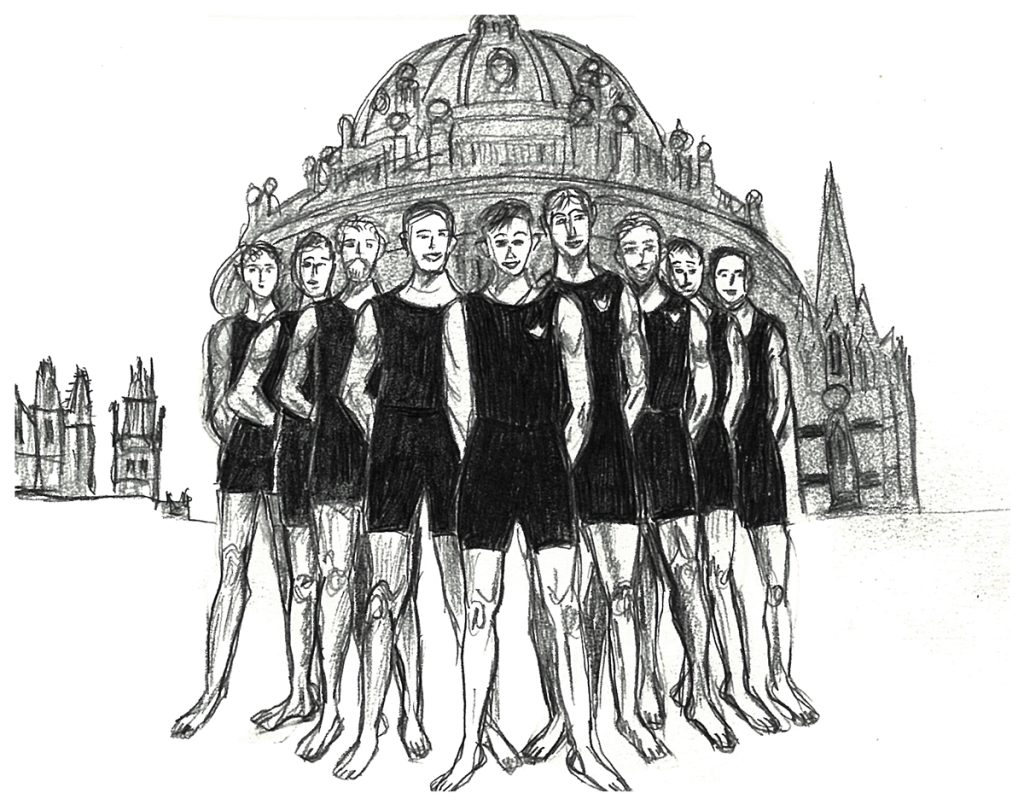
Now let’s ask the fundamental question again:
Can a university grant us more freedom compared to the best other options?
First of all, does freedom matter for adults, too? It sure does. Without freedom, you’re stuck in time and cannot improve your life.
There are two types of freedom, and we need to have them both to actually be free – each regarding the Game of Self and the Game of Life.
The Game of Self-freedom comes from Self-love and the overcoming of our own internal barriers. Everything we encounter in life has effects on the Game of Self. Whether we’re in Hunter or Sheep mode is the most important factor for the positive or negative accumulation of these effects, whether they cause the self-growth we want or a negative spiral of fears and insecurity. Since the Hunter and Sheep mode cycles can stick in any environment, we’ll assume whether we’re in a university or not is insignificant in this regard.
So we’re left with the impact of higher education on the Game of Life freedom. This is simply a matter of Resources, and the main ones in life are:
Freedom in the short term (a basic essential, the space and time needed to attract the other resources)
- Health (because if your health suffers, everything will suffer)
- Assets (eg, money, income streams, property, even monetizable ideas and structures, eg, an email list)
- People (both passive interactions with role models/teachers and active ones, like with mentors and emotionally supportive friends)
Let’s see how the university influences each of those. Remember, we don’t compare it with lying on the couch at home. We compare it to the best of the best options that you have. If you don’t feel confident in choosing these best options and being persistent in (about) their path, don’t worry, we’ll address these concerns too.
- Freedom in the short term
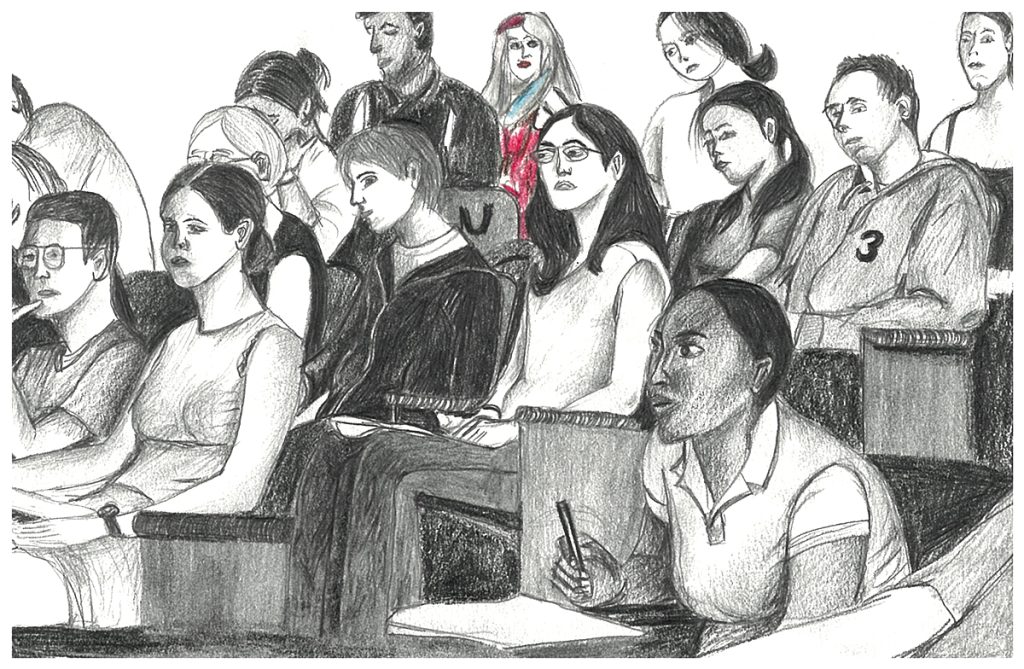
In terms of freedom in the near term, the university expects you to be at certain places at certain times, and even if you choose all your courses, they will still be taught the way the professors want.
Alternatively, as a self-learner, you can learn anything you want, using any approach you like from any expert on youtube. You’ll be in charge of your Speed and Direction. If you want to ask questions, there are Reddit, Quora, Facebook groups, and even paid online consulting by experts if something is that critical. It will still cost less than a degree from Harvard.
I’d say from this perspective, you start with more freedom when you’re on your own. It’s no coincidence that Steve Jobs, Bill Gates, Mark Zuckerberg, Oprah, and Lady Gaga are all college dropouts. Can you imagine any of them just sitting in class? It’s important to remember that you have just the same unlimited potential as they.
Overall: significant disadvantage
- Health

Health has components that the university might jeopardize, you’re likely to experience stress or not get enough sleep. University can very likely jeopardize your health as you’re likely to experience stress or not get enough sleep.
Access to healthy food can also be a problem at some smaller campuses. Overall, if you take the right steps (like skipping morning lectures after a party), you should be fine. But the university surely doesn’t offer any advantage regarding your physical health, you’re only risking a disadvantage.1
In regards to mental health, it’s possible to feel lonely in a crowd if you leave all your friends and support behind and move to a new city to study. This can potentially cause addiction problems, too. It is also possible to meet new lovely people who can get you out of Sheep mode and help you restart the Hunter spark in your life if you were already feeling low before. Change is usually good for mental health. So I’ll call this one even.
Overall: slight disadvantage
- Assets

The university costs money and time to attend, making it just as much of a money sinkhole as when your car breaks down every month for 4 years straight. It’s quite a lot to ask from anything that starts this bad financially to actually end well.
It’s like starting the marathon by running 4 km from the start in the opposite direction and then making a u-turn to cover these 4 again and then also the original 42 km. You could win, but the advantage you must have in running skills is borderline magic.
We know that the university is full of smart people, genius professors, but does it have financial magic?
No.
But how isn’t the university the best possible place to have and realize a business idea? This is where Google and Facebook were born? Everyone has watched The Social Network; it all happened in the dorm!
This is part of reality, but only a tiny small part that is publicly visible.
The road from an idea to a big company is very long and hard. Timing and luck have to align perfectly. It’s no coincidence that there is no second Google, even though nowadays every good developer can build a search engine, and there are even open-source frameworks for it. The combination of available technology (in the case of Google the price of RAM had just dropped enough so the search index could be in RAM, making Google blazingly fast), market demand (users were just discovering the web, usage was skyrocketing) and weak competition (the other search engines sucked) create a perfect moment to strike gold. This moment is more important than the idea itself!
That means that a good idea at a bad moment is not going to succeed. The more ambitious the idea, the less the chance. For projects like Google and Facebook, the chances of success are no more than 0,1%. There were hundreds to thousands of search and social network projects you have never heard of because they never took off.
Now, if I told you at the start of the marathon that if you ran 4 km backwards, you would have a 0,1% chance of getting flying shoes and be allowed to use them to win, would you do it?
Okay, too risky, plan B. We’re not going to make the next once-in-a-decade startup like Google or Facebook. We’ll aim a bit lower to increase the chances of success with an idea of a million, not a billion-dollar business, not something outrageous. Will this work? In my opinion…
No.
See, in regards to the market for money and ideas, a business idea needs to be very specific in order to succeed. Often, a really bold marketing plan has to be part of the idea, or it will never take off; that’s the depth needed. Like PayPal, which just gave users $10 to sign up and another $10 if they referred a friend. In the distant year 2000, this was unheard of. But it worked. Industry expertise is needed to get the specifics right, and nothing can take its place. School is more like a game to get good grades and be popular, it’s nothing like life. So, in university, you probably have no industry experience, which decreases your chances of doubling down on expertise. But… you’re full of enthusiasm, right? It will work somehow! Well… another very important criteria for startup success is co-founder selection. Mostly the patience and the ability to say “no” to toxic or not-engaged-enough-with-the-project co-founders. How does that play out on the campus?
The university is like a hive. No one really works by themselves. There is no way that you’ll discover a great idea without telling your drinking buddies half an hour later. It’s just how this place works. Mark Zuckerberg launched Facebook with his roommates (!), which led to massive problems and even court battles later on. Luckily, Facebook went huge, and there was money for all of them to settle, but for the average startup, such a ragtag team would be a death sentence.
Compare this to Steve Jobs and Steve Wozniak starting Apple in a garage. Focus, proper founder filtering process (roommate is not enough, duh!), and as a whole, sanity.
If you have a great idea, it’s best to have it in a small group of trusted people, or you get…
The Social Network madness. Enthusiasm is valuable, but so is common sense.
But don’t great ideas only come when you meet great people? Sometimes. First, let’s grade the assets/money/business ideas part properly, and then we move on to the people part.
Sometimes in life, you have to take a step back in order to thrust forward at maximum speed. But 4 years and a 5 to 6 figure sum? If your parents are not rich, it’s financial madness. The things that attract money the most are not ideas but existing money (capital) and the experience of actually making money in the free market. Which of those will you have at the end of the 4 years to make you think your odds are that great for your ideas?2
Overall: huge disadvantage
- People
Now, here is where the university can really shine.
Brilliant professors, some of the best scientific labs in the world, motivated fellow students… all in all, a paradise for intellectual growth… is not what I had in my university in Bulgaria.
Until now, it didn’t really matter which university you were in, unless you were on some rare, amazing scholarship, which would at least make the financial part better.
In general you were moderately fucked about your freedom, maybe a little bit fucked on health and very seriously fucked on money. No matter the university.
However, here we have to draw the line between the quality ones and the rest.
In the top universities of the world, you can meet people who would be hard to meet face to face every day. Both professors and fellow students. People can be precious. I agree that on some occasions, the benefit of meeting these people will be such a huge benefit that you can as well choose to go for it and sacrifice some temporary freedom and a lot of money.
But in at least 70% of the world’s universities, it’s probably not worth it.
So, research, ask students already studying at the places you consider, very specific questions. No question is off limits! You can ask about the uncomfortable stuff. You can ask about management corruption and the hygiene of the toilets. You can ask if the staff are nice. You can ask if there are crazy people among the professors (not a silly question, you don’t want your academic fate in the hands of even one crazy person). Or if there is sexual harassment of any kind, or racism. Every question will help you create a picture of this university and its culture as close to reality as possible. Ask them how their day goes minute by minute to see the motivation of students and professors, indicated by delays, skipping lectures, etc. If you’re becoming annoying with your endless questions that people stop answering, pay them cash to talk. Just ask a million questions, enough before you waste 4 years of your professional life and a ton of money at a parody university like I wasted 2 of mine.
Every university has a nice building and website and boasts about being amazing. But most are just hollow shells full of Bullshit. The only way to find the truth is to ask and to read unfiltered student posts on forums, Facebook groups, etc. But for the really ugly stuff, better ask. It’s people and culture that make the difference!3
Overall, it depends; potentially a huge advantage, but only in a small selection of top universities.
In the end, it turns out that the university choice will be a disaster in most cases.
Remember that even for the best of the best universities, it’s still a trade-off! Being admitted to Harvard doesn’t mean you have to go. If you’re very introverted and want to study History of Art, why do you need to go to Harvard and spend a ton of cash to learn the same information that YouTube and Wikipedia, books on the subject, and museums already have? Don’t cave into peer pressure – this is your life! No one should make choices for you. In 4 years, with the time and money saved from Harvard, you can build a History of Art blog that will promote you to a top wanted expert on the subject. I can assure you that having your name publicly cited as an expert by thousands is worth more than a Harvard degree. And the blog will be a financial asset worth 6 figures and bring you steady monthly income.
Now we know how to research a university. Let’s search inside. What do we really want?
There are 3 groups of people regarding needs:
- People who put themselves and their loved ones first (most people)
- People who put unknown people’s needs before their own (heroes)
- People who don’t know which group they’re in yet (potential heroes)
This is not meant to be judgmental. I usually put myself before others, but I also like to share any excess resources back with people. So anyone from any group can help the world and any other living person.
However, heroes and potential heroes are very precious. If a hero wants to be a doctor and save lives, objectively, I can tell them it’s a tough personal choice, regarding education time and cost, stress, long shifts, inability to work from home, etc. However, we need doctors! So I better shut the fuck up and help with whatever I can.
In this regard, if you’re planning to study medicine even in an average university (say, the best one locally available), you have my full support. Questions about freedom, money, and return on investment are irrelevant if you want to save lives. I can only give you my total respect. And we should make sure, as a society, you’re well rewarded for being a hero.
The same goes for therapists; we need a lot more of them, too.
If you’re not a hero or potential hero, then perhaps your goal in life is to be free and happy. Money is an important part of this. Now this is where my experience can help. And it says, “The university is not the right place for making money”.
Oh, and most general and tech degrees are now next to useless.
So, if university is actually a step back financially, what can you do instead?
First, you need to understand how money works; otherwise, how are you going to earn it?
Then you can either start a business (which is the real university for many things)
or find a good Job centered on growth and education over time.
When you have your time, space, focus, and youth energy fully pointed in one direction, miracles happen. After 2-3 years, you’ll be an expert in something that generates money. Meanwhile, your fellow students at the university will still be burning money.
Money is a religion for most people. They spend more than half their lives securing it. In these 4 years after high school, most of them collectively go financially crazy. It’s our duty to burst that bubble of bullshit.
Now, enough with the personal standpoint, let’s talk policy and look at the big picture.
So, for 70% of universities, we get an instant “no” regarding overall educational effectiveness compared to self-teaching. In my country of Bulgaria, I wouldn’t put a single university above this line.4
So, do we just close all Bulgarian universities? I’d close or downsize most but not all.
The thing is, we all need doctors and we all need engineers of all kinds, or the physical world will start falling apart.
IT experts, office administrators, advertising, sales, marketing, and writers can and better be self-taught. But as much as I love chaos and creativity, I’m still not in support of self-taught doctors, construction engineers, and airline pilots. The cost of some errors is too high. We’ll need to draw a line somewhere and keep some places open, even if not currently of the highest educational quality.
There are occupations like Lawyers, Accountants, and Pharmacists that require a degree to be in that occupation. It’s not the best system, but it works more or less, and if it works, don’t touch it, as too many things are much more broken.
And exact Science should also stay because of the labs… even if only for this one crazy motivated biology student that will spend all their time in the lab until they make a discovery that may change the lives of millions.
Arts also have a place in higher education. As does anything that requires a genius to create a next-generation genius, and cannot be done via YouTube or Zoom.
The good news is, when we close some useless public universities, government funding can increase for the rest, bringing more motivated professors who value practical knowledge, kinder staff, and better lab equipment.
Here is what I think should be removed (all fields equally or better learned in practice).
- All IT stuff, both software and hardware. This is where self-tuition shines.
- All economics except for accounting. Bulgaria is full of economists-by-education who know nothing about economics and nothing about anything else.
- Everything related to marketing, advertising, and sales.
- Writing and Journalism (if you want to learn how to write, write and read, and write more)
- Foreign Languages and culture (if you want to learn Swedish, go to Sweden, not a university)
- Sports (learning theory about sports is one of the stupidest things I’ve seen, in my opinion)
Here is what I think should be downscaled:
- Some humanities. Bulgaria has a weak civil society despite a record share of historians, political scientists, and philosophers. Apparently, they are of no help.
Here is what I think should be kept:
- Highly specialized occupations like pilots, sailors
- Army, Navy, Police academies, and first responders
- Math and Exact sciences + Statistics + Sociology
- Engineering
- Law
- Arts
Here is what should be increased and better funded:
- Medicine
- Psychology
As a result, we’ll have more doctors and therapists. But also more developers, as if they are all being self-taught, it sends everyone the signal they can become one.
And a final observation. Each decision we make sends an internal signal. When I quit university, I took full responsibility and felt like a grown-up for the first time. It’s an important moment for every adult. And I sent myself a signal that I wanted to live my life in Hunter mode.

Responsibility is extremely important for us and our participation in society. The more of it, the better.
If you study till 25+, you take responsibility at a later age. At this later age, you are likely to have less youth enthusiasm and idealism, a bit less energy, and family and kids may be on the horizon. Which means that the window within which you can fight for social Change and a better world with all of your time and energy is already closing. You can still do it, and should if possible. But there is no reason to wait that long. People suffer needlessly every day from issues we can collectively solve (e.g., preventable diseases in developing countries), and while we live in one of the best moments of human history, the future has challenges. You can start helping at 20. Hell, if you’re Greta, you can start at 15. The best time to do something of value is always now.
If you’re not sure where to start (like I was not sure for many years), you can prepare by building freedom and attracting resources like money, assets, and like-minded friends. Education is an important part of this preparation. But trust me, in most cases, the best teacher is looking at you in the mirror.
You don’t need a foreign structure such as a university. You don’t need anyone to impose discipline on you. Let go of Pressure, let go of fear. Let love and Chaos lead the way. You’re already free, you just may not know it yet.
And if you’re currently studying for a non-hero major and your motivation is half-hearted to none,
QUIT NOW.
You have no idea how good it feels.
- Hallet, J., et al. University Student Health and Wellbeing Study: A testretest reliability study of a web-based survey investigating undergraduate student health and wellbeing.// Health promotion journal of Australia: official journal of Australian Association of Health Promotion Professionals, 2020.
https://www.researchgate.net/publication/339666623 - Bohara, S., et al. Investigating the effect of tuition fees on students’ choice of college mediated by household income- PLS SEM.// International Journal of Early Childhood Special Education (INT-JECS), 2022.
https://www.researchgate.net/publication/361182743 - Zaid, M., Atshan, N. The Impact of University Culture on Academic Performance: Knowledge Management as a Mediating Variable.// Journal of Asian Multicultural Research for Economy and Management Study, 2023.
https://www.researchgate.net/publication/371712876 - Charokar, K., et al. Self-directed Learning Theory to Practice: A Footstep towards the Path of being a Life-long Learner.// Journal of Advances in Medical Education & Professionalism, May 2022.
https://www.researchgate.net/publication/362423195
Coming soon 🙂

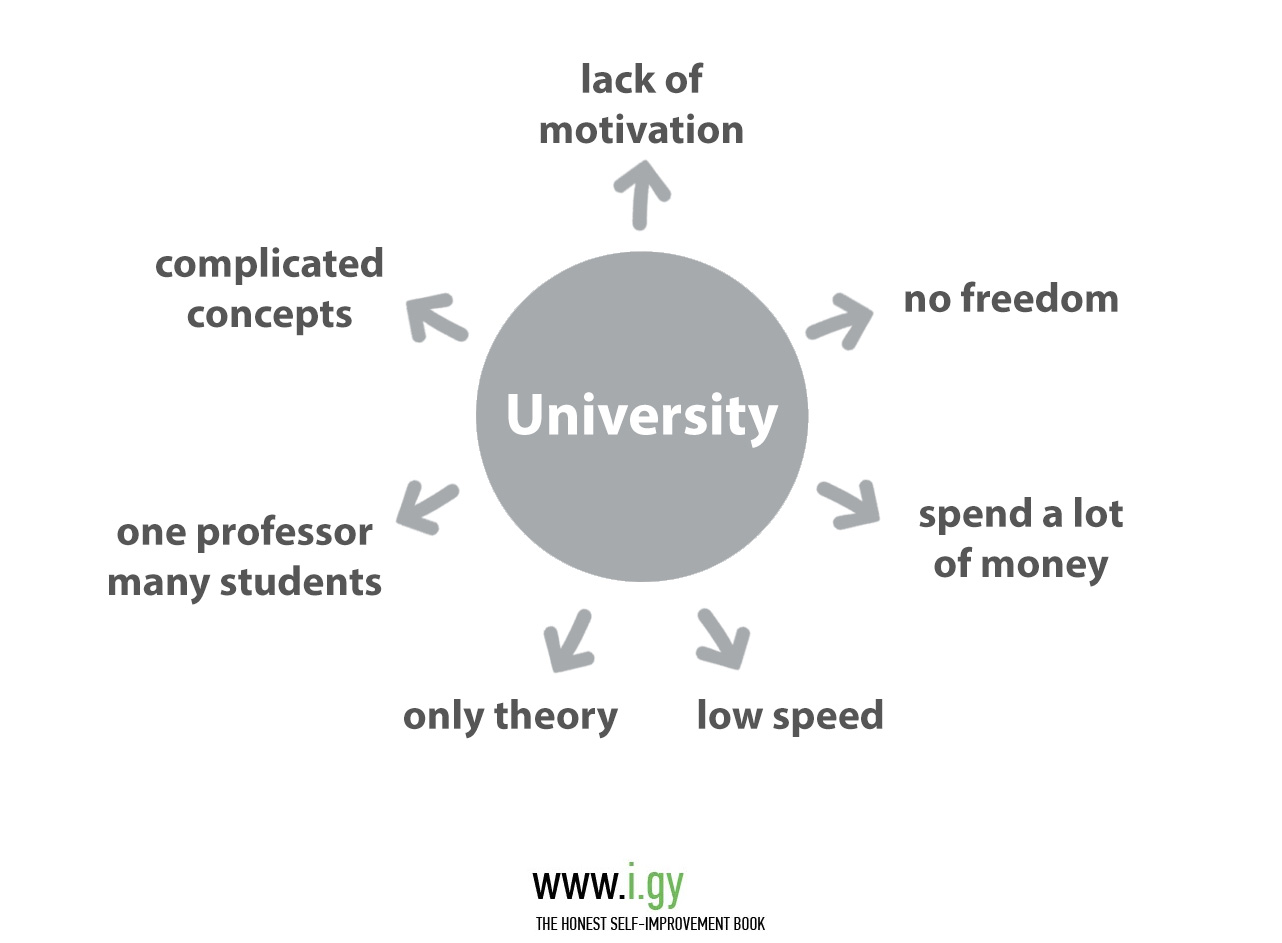
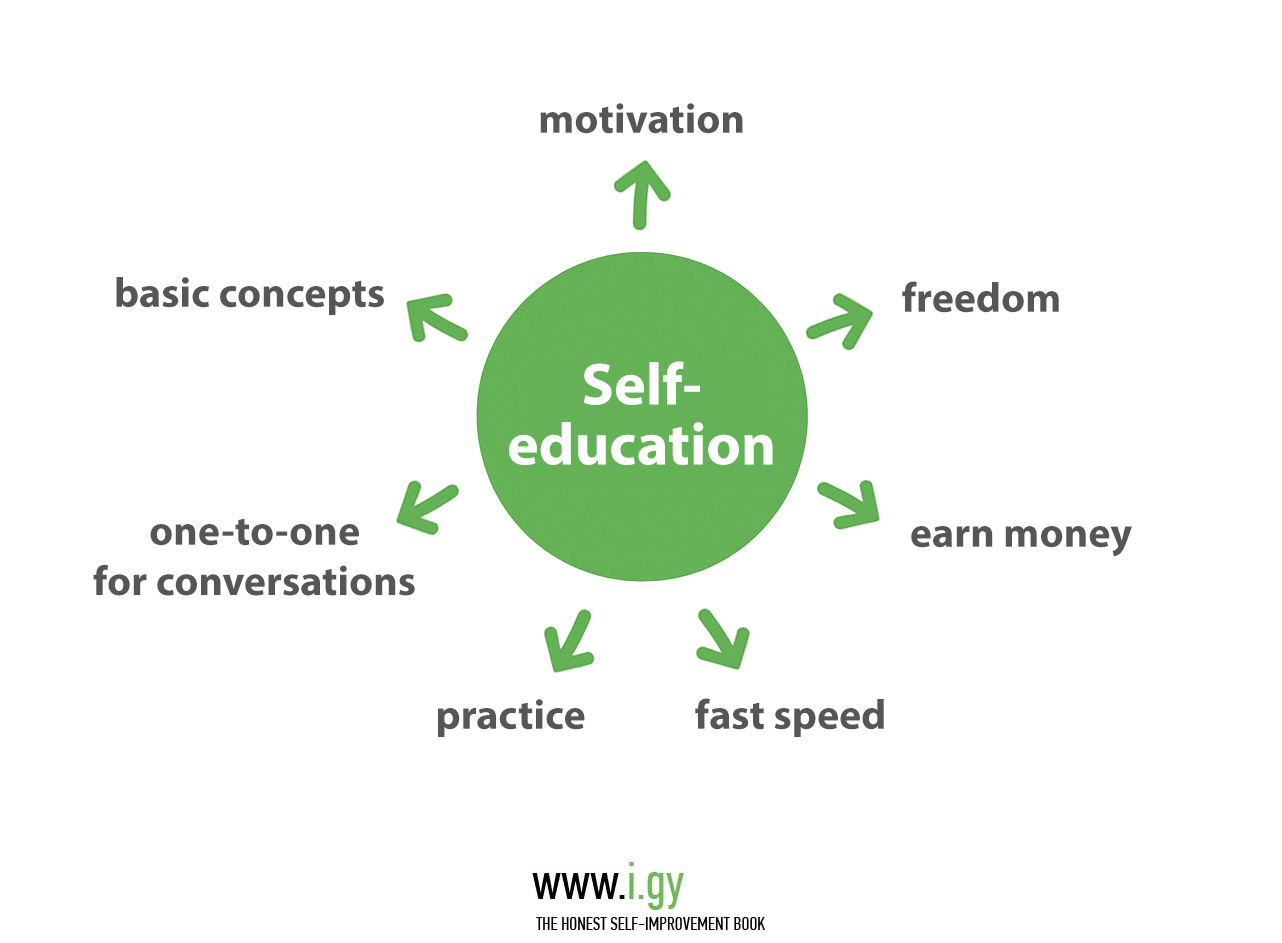
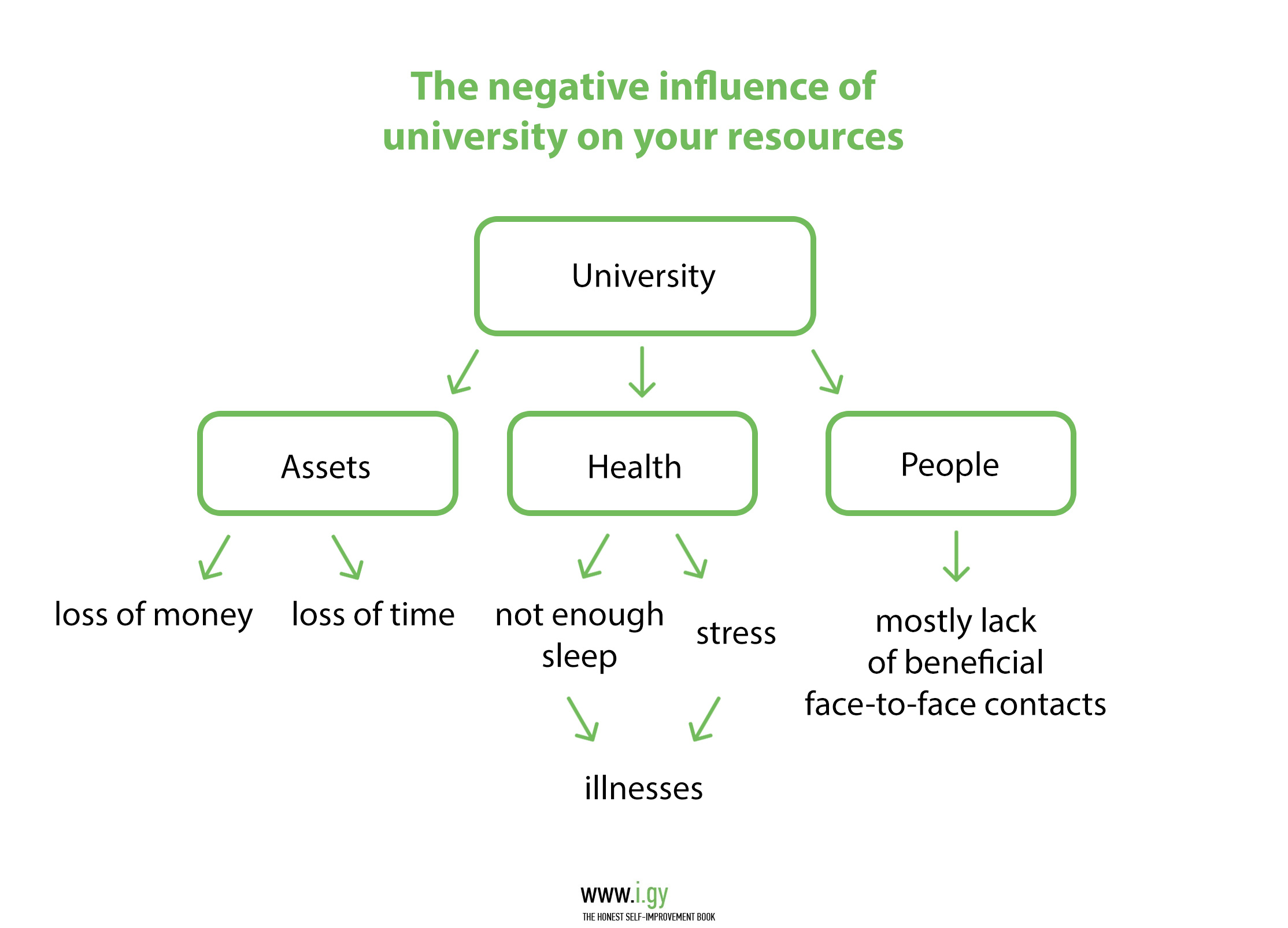




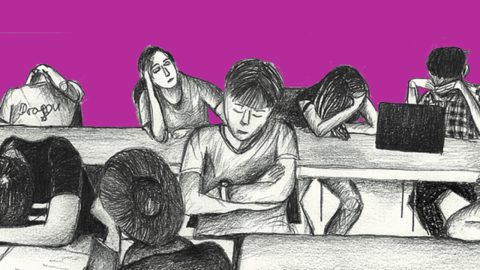
























I feel pretty much the same about universities. For me, it was clear that I was going to study. And I wanted to study mathematics abroad. I’ve chosen one of the top three German technical universities. Nevertheless, I experienced the same lack of meaning. My motivation dropped from 100% to 0% in only one month. Full inner resignation in only one month of regular lectures! But for me to drop off has never been a choice. I have decided to stay, to do it as fast as possible and do it as much as possible in the way I have wanted to.
My bachelor programme was supposed to be done in three years terms. I dropped all lectures and most of the exercises and started to learn at home. In this way, I managed to save a lot of time. I also started to work as a programmer and this was a great experience – I learned quite a lot in a short time on a real-world project. I managed to finish all my exams in two years and had the time to do a one-term internship and my bachelor thesis in the industry. I was the only student to do this. We were not supposed to write our thesis outside the university and also not supposed to have an internship. So I had to go through a large amount of bureaucracy, but in the end it was a great success. I’ve done exactly what I wanted and had a great year full of new experiences and fun. And I learned so much more than in the classroom.
After that, again because of bureaucracy, I had to wait for half a year in order to enroll for my Master’s of Science. And again, I was the first student at this university that studied mathematics with minor work sciences. I was not supposed to do that. I managed three terms in one. And once again, I was not supposed to do my thesis in the industry, but nevertheless I’ve done it. And it was again a great success. And after all, I graduated half a year earlier. But I was in a severe burn-out.
After four and a half years, I finally felt free. It was a great relief. Because of my studies, I was often stressed and ill. Yes, Kalin, you are completely right – universities influence our mental and physical health very negatively. After graduation, I felt for the first time in my life really free and inspired. And that is how I feel all the time after that. My motto for the rest of my life is ‘Stay far away from any university or other form of formal education’.
Yes, health was a disaster. Time and freedom also. People were the only fine thing at this university. At least it was completely free at that time, so I spent no money on my education. No fun at all. At least I managed to do everything in such a way, so I had a great variety of experience. But in five years, with all this energy spent, I could have built a great business and be rich and happy much earlier. Long-term freedom is definitely the most important thing!